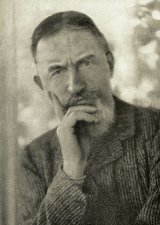Pygmalion Page #26
Pygmalion is a play by George Bernard Shaw, named after a Greek mythological figure. It was first presented on stage to the public in 1913. In ancient Greek mythology, Pygmalion fell in love with one of his sculptures, which then came to life.
Clara had a startling eyeopener when, on being suddenly wakened to enthusiasm by a girl of her own age who dazzled her and produced in her a gushing desire to take her for a model, and gain her friendship, she discovered that this exquisite apparition had graduated from the gutter in a few months' time. It shook her so violently, that when Mr. H. G. Wells lifted her on the point of his puissant pen, and placed her at the angle of view from which the life she was leading and the society to which she clung appeared in its true relation to real human needs and worthy social structure, he effected a conversion and a conviction of sin comparable to the most sensational feats of General Booth or Gypsy Smith. Clara's snobbery went bang. Life suddenly began to move with her. Without knowing how or why, she began to make friends and enemies. Some of the acquaintances to whom she had been a tedious or indifferent or ridiculous affliction, dropped her: others became cordial. To her amazement she found that some "quite nice" people were saturated with Wells, and that this accessibility to ideas was the secret of their niceness. People she had thought deeply religious, and had tried to conciliate on that tack with disastrous results, suddenly took an interest in her, and revealed a hostility to conventional religion which she had never conceived possible except among the most desperate characters. They made her read Galsworthy; and Galsworthy exposed the vanity of Largelady Park and finished her. It exasperated her to think that the dungeon in which she had languished for so many unhappy years had been unlocked all the time, and that the impulses she had so carefully struggled with and stifled for the sake of keeping well with society, were precisely those by which alone she could have come into any sort of sincere human contact. In the radiance of these discoveries, and the tumult of their reaction, she made a fool of herself as freely and conspicuously as when she so rashly adopted Eliza's expletive in Mrs. Higgins's drawing-room; for the new-born Wellsian had to find her bearings almost as ridiculously as a baby; but nobody hates a baby for its ineptitudes, or thinks the worse of it for trying to eat the matches; and Clara lost no friends by her follies. They laughed at her to her face this time; and she had to defend herself and fight it out as best she could. When Freddy paid a visit to Earlscourt (which he never did when he could possibly help it) to make the desolating announcement that he and his Eliza were thinking of blackening the Largelady scutcheon by opening a shop, he found the little household already convulsed by a prior announcement from Clara that she also was going to work in an old furniture shop in Dover Street, which had been started by a fellow Wellsian. This appointment Clara owed, after all, to her old social accomplishment of Push. She had made up her mind that, cost what it might, she would see Mr. Wells in the flesh; and she had achieved her end at a garden party. She had better luck than so rash an enterprise deserved. Mr. Wells came up to her expectations. Age had not withered him, nor could custom stale his infinite variety in half an hour. His pleasant neatness and compactness, his small hands and feet, his teeming ready brain, his unaffected accessibility, and a certain fine apprehensiveness which stamped him as susceptible from his topmost hair to his tipmost toe, proved irresistible. Clara talked of nothing else for weeks and weeks afterwards. And as she happened to talk to the lady of the furniture shop, and that lady also desired above all things to know Mr. Wells and sell pretty things to him, she offered Clara a job on the chance of achieving that end through her. And so it came about that Eliza's luck held, and the expected opposition to the flower shop melted away. The shop is in the arcade of a railway station not very far from the Victoria and Albert Museum; and if you live in that neighborhood you may go there any day and buy a buttonhole from Eliza. Now here is a last opportunity for romance. Would you not like to be assured that the shop was an immense success, thanks to Eliza's charms and her early business experience in Covent Garden? Alas! the truth is the truth: the shop did not pay for a long time, simply because Eliza and her Freddy did not know how to keep it. True, Eliza had not to begin at the very beginning: she knew the names and prices of the cheaper flowers; and her elation was unbounded when she found that Freddy, like all youths educated at cheap, pretentious, and thoroughly inefficient schools, knew a little Latin. It was very little, but enough to make him appear to her a Porson or Bentley, and to put him at his ease with botanical nomenclature. Unfortunately he knew nothing else; and Eliza, though she could count money up to eighteen shillings or so, and had acquired a certain familiarity with the language of Milton from her struggles to qualify herself for winning Higgins's bet, could not write out a bill without utterly disgracing the establishment. Freddy's power of stating in Latin that Balbus built a wall and that Gaul was divided into three parts did not carry with it the slightest knowledge of accounts or business: Colonel Pickering had to explain to him what a cheque book and a bank account meant. And the pair were by no means easily teachable. Freddy backed up Eliza in her obstinate refusal to believe that they could save money by engaging a bookkeeper with some knowledge of the business. How, they argued, could you possibly save money by going to extra expense when you already could not make both ends meet? But the Colonel, after making the ends meet over and over again, at last gently insisted; and Eliza, humbled to the dust by having to beg from him so often, and stung by the uproarious derision of Higgins, to whom the notion of Freddy succeeding at anything was a joke that never palled, grasped the fact that business, like phonetics, has to be learned.
Translation
Translate and read this book in other languages:
Select another language:
- - Select -
- 简体中文 (Chinese - Simplified)
- 繁體中文 (Chinese - Traditional)
- Español (Spanish)
- Esperanto (Esperanto)
- 日本語 (Japanese)
- Português (Portuguese)
- Deutsch (German)
- العربية (Arabic)
- Français (French)
- Русский (Russian)
- ಕನ್ನಡ (Kannada)
- 한국어 (Korean)
- עברית (Hebrew)
- Gaeilge (Irish)
- Українська (Ukrainian)
- اردو (Urdu)
- Magyar (Hungarian)
- मानक हिन्दी (Hindi)
- Indonesia (Indonesian)
- Italiano (Italian)
- தமிழ் (Tamil)
- Türkçe (Turkish)
- తెలుగు (Telugu)
- ภาษาไทย (Thai)
- Tiếng Việt (Vietnamese)
- Čeština (Czech)
- Polski (Polish)
- Bahasa Indonesia (Indonesian)
- Românește (Romanian)
- Nederlands (Dutch)
- Ελληνικά (Greek)
- Latinum (Latin)
- Svenska (Swedish)
- Dansk (Danish)
- Suomi (Finnish)
- فارسی (Persian)
- ייִדיש (Yiddish)
- հայերեն (Armenian)
- Norsk (Norwegian)
- English (English)
Citation
Use the citation below to add this book to your bibliography:
Style:MLAChicagoAPA
"Pygmalion Books." Literature.com. STANDS4 LLC, 2025. Web. 12 Jan. 2025. <https://www.literature.com/book/pygmalion_78>.




Discuss this Pygmalion book with the community:
Report Comment
We're doing our best to make sure our content is useful, accurate and safe.
If by any chance you spot an inappropriate comment while navigating through our website please use this form to let us know, and we'll take care of it shortly.
Attachment
You need to be logged in to favorite.
Log In